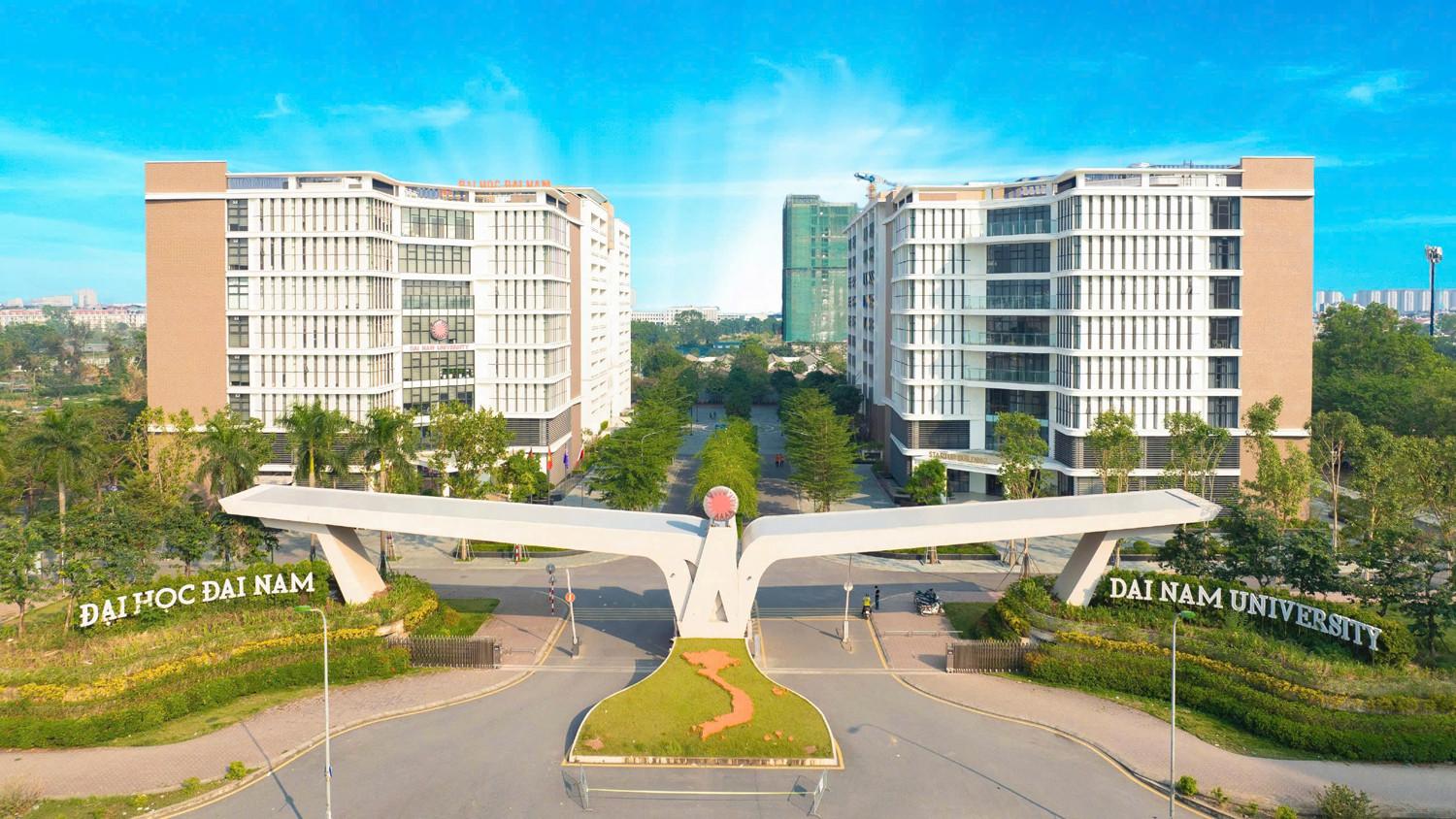MASTER'S DEGREE TRAINING PROGRAM
Industry: Economic Law
(Issued with Decision No.: /QD-DN issued on date month year)
of the President of Dai Nam University)
1. General information
- Training field: Economic Law
- Program code: 8380107
- Program name: Master's program in Economic Law
- Education level: Master
- Training form: Full-time
2. Program Summary
2.1. Training objectives
* General objectives:
The Master of Applied Economic Law training program of Dai Nam University is designed to equip students with in-depth knowledge in the field of Economic Law, as well as the necessary skills to become experts in the field. After completing the course, students will have systematic and modern knowledge of economic law, and have the ability to work in the public sector (State management agencies at the ministerial, sectoral and local levels) and other areas (schools, organizations, enterprises).
* Specific objectives:
- Regarding knowledge: After graduating from the Master's program in Applied Economic Law of Dai Nam University, students will master in-depth knowledge of Vietnamese and international economic law, and be able to undertake work at the expert level in the trained field. In addition, students of the Master's program in Economic Law of Dai Nam University will be people with critical thinking; have the ability to criticize - perceive multidimensionally and find solutions; can develop new knowledge and continue research at the doctoral level.
- Regarding skills: Students who are trained in practice-oriented economic law master's degree at Dai Nam University will:
+ Applying in-depth economic legal theory to solve complex practical problems in economic management, investment and business.
+ Legal research skills for learners to continue self-training and develop personal capacity.
+ English skills are at the level of reading and understanding a report or presenting a speech on most topics in work related to economic law; can express in English in most common professional situations; can write reports related to professional work, clearly present opinions and debate a professional issue in English.
2. Output standards
- Knowledge:
- Understand in-depth theoretical and practical knowledge of the main pillars of economic law such as: commercial law, labor law, financial and banking law, land law, environmental law;
- Deep understanding of the main topics in the training program including: business entities; establishment, organization, management, disputes, dissolution, bankruptcy, competition; contracts, taxes, international trade, e-commerce, consumer protection, social responsibility, etc.;
- Understand the interdisciplinary knowledge between economic law and related fields such as: property, inheritance, marriage or other general social knowledge;
- Understand general knowledge about administration, management and application in professional operation management and risk management.
- Skill:
- Effectively apply tools and methods to look up and search for economic legal documents and content to serve the work;
- Proficiently apply techniques in communication, presentation, and teamwork;
- Analyze situations in depth to provide effective consulting, negotiation and drafting of economic contracts;
- Synthesize and evaluate arising issues and disputes in business activities to come up with optimal solutions;
- Achieve English proficiency level 4/6 of the Vietnamese foreign language proficiency framework.
- Self-control and responsibility
- Proactively synthesize and analyze situations to detect and solve problems in the field of economic law with valuable initiatives;
- Actively orient the development of personal capacity to adapt to a highly competitive environment and professional leadership capacity;
- Evaluate complex professional and technical issues to draw expert conclusions; defend and take responsibility for those expert conclusions;
- Analyze and evaluate factors and contexts to decide on the direction of development of assigned work tasks; develop plans to promote collective intelligence in management and professional activities; lead expertise to handle major issues.
- Possible job positions after graduation: Masters graduates majoring in applied economic law can participate in professional work in the following positions:
- Do management or other practical work in enterprises of all economic sectors;
- Working in law firms, law offices, arbitration organizations etc;
- Doing practical work at other legislative, executive and judicial agencies in the state apparatus such as: National Assembly, Government, court system, ministries, ministerial-level agencies and other economic management agencies;
- Teaching and scientific research at law training institutions, institutes and law research centers.
2.3. Overall training program
Total number of credits: 60 credits, including:
- General knowledge block: 12 credits (03 modules)
- Basic industry knowledge block:
+ Compulsory courses: 09 credits (03 courses)
+ Elective courses: 08 credits (04 courses)
- Specialized knowledge section:
+ Compulsory courses: 09 credits (03 courses)
+ Elective courses: 10 credits (05 courses)
- Thesis: 12 credits.
The courses and theses in the Master of Economic Law training program are arranged as follows:
TT | COURSE CODE | COURSE NAME | VOLUME (CREDITS) | ||
Total | Theory | Discuss, practice, test | |||
Part I. GENERAL KNOWLEDGE | 12 | ||||
1 | DNTH801 | Philosophy | 4 | 2 | 2 |
2 | DNTA802 | English | 5 | 2.5 | 2.5 |
3 | DNNC803 | Legal research methods | 3 | 1.5 | 1.5 |
Part II: BASIC KNOWLEDGE OF THE INDUSTRY | 14 | ||||
Required courses: | 6 | ||||
4 | DNTM810 | Advanced and modern issues of Commercial Law | 2 | 1 | 1 |
5 | DNLD811 | Advanced and modern issues of Labor Law | 2 | 1 | 1 |
6 | DNTN812 | In-depth and modern issues of Finance and Banking Law | 2 | 1 | 1 |
Elective courses: choose 4 out of the following 8 courses (4x2 = 8 credits) | 8 | ||||
7 | DN813 | Law on enterprises and other business entities | 2 | 1 | 1 |
8 | ĐNĐĐ814 | Advanced and modern issues of Land Law | 2 | 1 | 1 |
9 | DNMT815 | Advanced and modern issues of Environmental Law | 2 | 1 | 1 |
10 | DNCT816 | Competition law | 2 | 1 | 1 |
11 | DNDT817 | Investment law | 2 | 1 | 1 |
12 | DNPS818 | Bankruptcy law | 2 | 1 | 1 |
13 | DNQT819 | International commercial law | 2 | 1 | 1 |
14 | DNNN820 | State management of economy | 2 | 1 | 1 |
Part III: SPECIALIZED KNOWLEDGE | 22 | ||||
Required courses: | 9 | ||||
15 | DNHD850 | Negotiation and drafting of contracts in business | 3 | 1.5 | 1.5 |
16 | DNTC851 | Business dispute resolution | 3 | 1.5 | 1.5 |
17 | DNQT852 | Business management skills | 3 | 1.5 | 1.5 |
Elective courses: choose 5 out of the following 10 courses (5x2 = 8 credits) | 10 | ||||
18 | DNKL853 | Labor dispute resolution skills | 2 | 1 | 1 |
19 | DNBT954 | Law on land acquisition and resettlement compensation and support | 2 | 1 | 1 |
20 | DNAT955 | Applying tax laws in business activities | 2 | 1 | 1 |
21 | DNSH856 | Intellectual property law in business | 2 | 1 | 1 |
22 | DNCK857 | Law on securities trading | 2 | 1 | 1 |
23 | DNTD858 | Consumer protection law | 2 | 1 | 1 |
24 | DNXH859 | Law on corporate social responsibility | 2 | 1 | 1 |
25 | DNBS860 | Law on real estate business | 2 | 1 | 1 |
26 | DNTD861 | E-commerce law | 2 | 1 | 1 |
27 | DNBH827 | Application of laws on wages and insurance in enterprises | 2 | 1 | 1 |
28 | DNTT828 | Internship | 3 | ||
Thesis | 12 | ||||
TOTAL | 60 |
You can see more information in the master's admission announcement.










